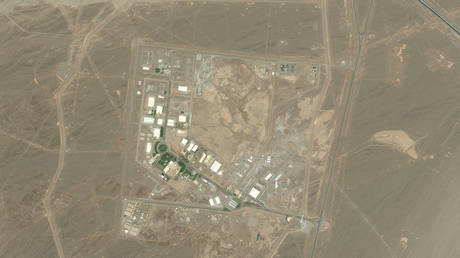ARTICLE AD BOX
While Israel’s latest airstrike in Syria appears totally unhinged, there seems to be clear strategic thinking
On April 1, Israel bombed and ultimately destroyed the Iranian consulate annex building situated next to the Iranian Embassy in Damascus, Syria. The strike, which killed seven military officials, was widely condemned by the international community as a clear violation of Syria’s sovereignty, as well as of the Vienna Convention and the established norms of international relations.
A cursory look through history shows that state actors have virtually never attacked the diplomatic missions of other states, except during periods of total war. The most relevant and recent example is when the US bombed the Chinese Embassy in Belgrade, today’s Serbia, in 1999, which it claimed was an accident. Though, to be sure, Beijing did not believe this was the case despite apologies from the administration of President Bill Clinton.
Such a situation is totally unacceptable and sets a horrible precedent for international relations. Israel, as well as countries like the US, do not have the right to exercise military actions in Syria without the express consent of the UN-recognized government of Syria. Doing so is a blatant violation of the UN Charter.
In addition to violating the UN Charter, the attack on the Iranian consulate is a clear violation of the 1961 Vienna Convention on Diplomatic Relations and the 1963 Vienna Convention on Consular Relations.
Read more US ‘very concerned’ over potential Israel-Iran war – White House
US ‘very concerned’ over potential Israel-Iran war – White House
It is a bold gambit for the government of Prime Minister Benjamin Netanyahu to have resorted to such an escalation. It begs the question, why did Israel do this?
According to the New York Times, one of the strikes killed General Mohammad Reza Zahedi, who was believed to have been in charge of Tehran’s relations with Hezbollah in Lebanon and other non-state groups in Syria, having served extensively across the Middle East during his tenure.
Perhaps the most simple explanation for the attack could be that it was meant to stifle the logistical operations of the “Axis of Resistance” and any potential attack against Israel by a united front.
At the same time, it is probably far more complicated and could do with the fact that the current US policy of carte blanche for Israel will almost certainly not survive until the end of this decade. For military leaders in Israel, now could be the only time to act in what could potentially be an existential war.
Public opinion has plummeted in the West for Israel and its ongoing atrocities in Gaza, but it did not begin there. In 2021, during weeks of fighting in Gaza that year, for the first time ever, members of the US Congress went on the record to criticize Israel. The following year, mainstream human rights organizations like Amnesty International and Human Rights Watch published scathing reports accusing Israel of apartheid.
In the middle of last month, the administration of President Joe Biden abstained from a vote on a UN Security Council resolution calling for an immediate ceasefire in Gaza. Biden also personally told Netanyahu on April 4 that he had to change his approach to the unfolding humanitarian disaster in Gaza. Despite these actions, the US has maintained that the UNSC resolution is non-binding and is still providing arms for Israel’s war effort, effectively making any words or abstentions moot.
Even if US support may be shakier than in the past, it is clear that Washington is still nominally on the side of the Jewish state – at least for now. Thus, it could be seen that the stakes for Israel are extremely high.
Finally, an undeniable factor is that the current Israeli government’s survival is the primary driving force behind this attack. Senate Majority Leader Chuck Schumer, the most senior Jewish elected official in Washington, on March 14 called out Prime Minister Netanyahu personally in a speech to the Senate.
He accused the leader of “allowing his political survival to take precedence over the best interests of Israel.” The senator called for new elections, adding that Israel “cannot hope to succeed as a pariah opposed by the rest of the world.”
Read more Israel ready to attack Iranian nuclear sites – media
Israel ready to attack Iranian nuclear sites – media
Israel, the most well-equipped military in the Middle East, is in a state of total war with a guerilla group, Hamas, that is comparatively fighting with sticks and rocks. The fact that it has not yet achieved its objective of eradicating Hamas and freeing the hostages it took on October 7 last year is extraordinarily embarrassing for the Netanyahu government. Additionally, the near-unified international backlash against Israel for its military actions in Gaza has the made situation unsustainable – though retreat would also mean political suicide for the Likud Party.
It is clear that the Israeli prime minister needs an out. An obvious route would be to provoke the Iranian government into a major escalation, diverting international attention away from Israel’s crimes in Gaza and instead forcing Washington and its allies to rally behind the Jewish state in apparent self-defense. Interestingly, Biden seemed to create space for such a strategy during his latest call with Netanyahu when he also added that the US would defend against “public Iranian threats against Israel and the Israeli people.” For its part, Israel has warned Iran it could take things to a “new level” if it retaliated for the airstrike in Damascus.
Judging by the reaction from within Iran, evident by official statements and reports from the state media, it is clear that major sectors of civil and elite society in Tehran are demanding reprisal for this attack. According to anonymous Western intelligence reports cited by media outlets Bloomberg, such an attack is very likely.
But it is also likely that this is precisely what the Israeli government wants to happen, hoping that a kneejerk need for revenge – in addition to the emotions stirred by the situation in Gaza – could force a strategic misstep by the Iranian government, allowing Israel to make a last-ditch effort to secure US support for its military effort and also ensure Netanyahu’s political survival.
.png)
 7 months ago
5
7 months ago
5








 English (US)
English (US)